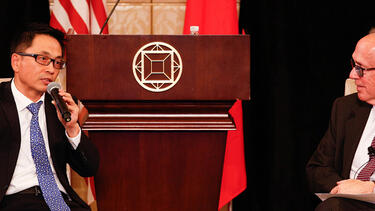Alumni
Renewable Energy Is Easier Than Ever to Build—and Harder to Talk About
Advances in technology and a maturing development ecosystem have made renewable energy more economical, less risky, and increasingly rewarding for landowners, says Reid Buckley ’90, a partner at Orion Renewable Energy Group. But it has also become more politicized.

How Do You Invest in a Changing China?
Lei Zhang ’02 has been one of the most successful investors in China during a time of unprecedented change. In a conversation with Yale’s Stephen Roach, he talked about rapid shifts in China’s business and culture, the birth of a consumer class, the Chinese innovation model, and the outmoded views of the country that remain prevalent in the West.

Are Real Estate Cycles Over?
A real estate boom can drive the construction of new homes, commercial centers, and skyscrapers, reshaping cities. The following bust can leave neighborhoods vacant. Have factors like the increasing availability of public information about real estate and the shift toward a global marketplace tamed a cycle that has played out repeatedly over the centuries?

Can Low-Hanging Fruit Drive Earnings Growth?
Jeremy Eden ’86 and Terri Long, co-CEOs of consulting firm Harvest Earnings, argue that organizations ignore ways to significantly grow earnings because of “behaviors that limit what we know and how we think.” Their solution starts with asking lots of questions.

How Do You Make the Case for Corporate Responsibility?
What obligations does a corporation have to society? The way that question is answered has evolved over time. So have the tools of those working to expand the role of corporate social responsibility and sustainability.
What’s the Potential of Disruptive Green Technology?
Green tech investors want to put their money behind firms with the potential to disrupt their industries and bring both positive environmental impacts and financial success. But what’s disruptive is by its nature unprecedented and unpredictable. How do investors assess the potential of a green technology company?

How Do Leaders Advance Sustainability in Complex Organizations?
Sustainability leaders often have to interact with a wide range of stakeholders with varied interests and incentives. They need to figure out the best way to engage, communicate, prioritize, and implement—in other words, to persuade. According to a panel of sustainability executives, that can mean sidestepping the language and baggage of sustainability entirely.
How Can You Get the Most out of Big Data?
The theoretical possibilities for big data are limitless, but putting so much information to good use requires big thinking. Unilever’s Gina Boswell explains the principles that the global company uses to effectively mine its data troves.

Can We Fix the Public Pensions Crisis?
Millions of government workers in the U.S. are relying on pension plans for retirement, and yet these plans are underfunded by at least $1 trillion. Asset manager Ranji Nagaswami ’86 argues that addressing this challenge is about more than assets and liabilities—we have to look at how funds are run and, critically, how they think about risk.
How Do You Hire When Everything Keeps Changing?
How do companies with rapidly evolving business plans and a constantly shifting competitive landscape hire the right people for tomorrow, let alone next year? While education and training still matter, Laszlo Bock, head of people operations at Google, says that the company looks for people with the ability to learn, solve problems, and step in when leadership is needed.

How Does Your Theory of Markets Shape Your Portfolio?
Investors put financial theory into practice every day. How efficient are markets? Can market participants advantageously match their capabilities to the right investments or leverage an information advantage? A panel of asset managers discusses how they see the theories playing out in real markets.